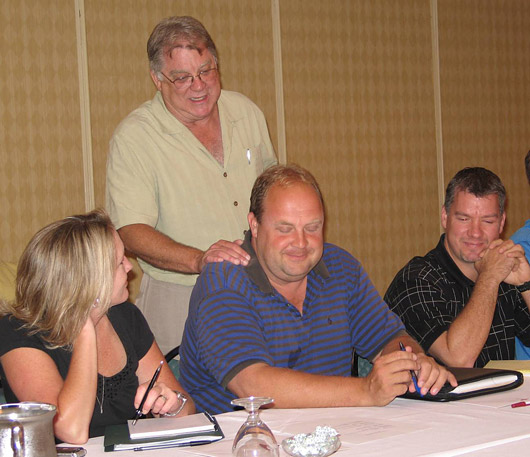Articles Written by Charles Vander Kooi

It was hard not to smile at a Charles Vander Kooi presentation, even if you got picked on as “Billy-Bob.”
The ding-dong factor
How to deal with unscrupulous general contractors, owners, architects, developers and their lot.
By Charles Vander KooiEditors note: It was difficult choosing a favorite article as a tribute to Charles Vander Kooi. There were lots of runners-up. To see our entire archives of Charles’ articles, visit HardscapeMagazine.com/articles_vander_kooi.htm. Hope they bring a smile to your face.
Several years ago I had just put the finishing touches on a bid for a site-development job when I got a call about the job from one of my good friends, my bonding agent.
"Charlie," he said, "I see you've got a bond for such-and-such project. Have you ever worked for this architect, Mr. Ding-Dong, before?"
"No, I haven't," was my response.
"Well, let me tell you a few things."
And, he went on to say that there was only 1 other contractor who had even considered pulling a bond on the job. This particular architect had gotten his reputation by telling clients that he would cost the contractor money. He would get the contractor to bid a job thinking they knew what was included, but he would get them to do more work than they had planned on.
Be wise to intentional confusion
Furthermore, he had a broken accent which he used to throw off any discussion. His favorite statement was, "No shange orders my jobs! No shange orders my jobs!" It didn't matter if the contractor couldn't find a reference to what he wanted him to do, he'd say, "No shange orders my jobs!" He'd tell the contractor that it was on another set of plans for another job, and that they should have known that when they bid the job.I should have been tipped off because this job I was bidding for $838,000 had only 3 sheets of drawings. My 6-year-old daughter printed better than what was printed on those plans. It looked like some of the words were printed on the original in pencil and then smudged.
Dealing with Mr. Ding-Dong
I thanked my bonding agent, hung up the phone, took out my bid proposal, changed a 3 to an 8 and then bid the job at $888,000. I added $50,000 for the ding-dong factor. The only other bidder came in at $900,000+ and we were awarded a contract.When I set the job up on the computer, I actually assigned a separate cost code for the ding-dong factor. I put $30,000 under that category. (I wanted to make $20,000 off of the ding-dong.)
I told my project superintendent that every time Mr. Ding-Dong visited and asked him to do things that weren't anywhere on the plans, he should let me know. In the following days, when we had to submit a change order, we'd hear "No shange orders my job." We sent letters, argued and fought, but finally we charged it to the ding-dong factor.
When the job was finished, I went out to do the punch list. The architect was there with a big grin on his face and an attitude that said, "I cost you money." I took on a down-in-the-mouth, defeated look during the whole meeting. But, as I was driving back to my office, I was grinning like a bear. Before I left my office, I pulled up a report that showed only a little over $25,000 had been charged to the ding-dong factor.
Ding-dongs are everywhere
Now, I know ding-dongs in Denver, Dallas, Los Angeles and San Diego. I know ding-dongs in Houston, Kansas City and Atlanta. Sometimes they are architects, sometimes they are owners, sometimes they are developers, and many times they are general contractors.They are people who take advantage of other people and they squeeze them for all they can get. They pay slow and demand much. They shop your bid and expect deals all the time. They never admit that they're wrong. They know that you are always wrong. They are ding-dongs.
It doesn't take long for these ding-dongs to get a reputation and for owners to learn that using these characters will cost them more money on the bids because contractors have added the equivalent of a ding-dong factor. Unfortunately, there is damage done. General contractors lose bids because their subcontractors are bidding the work higher so they won't have to work for these people.

Charles and long-time contractor client George Vizmeg at a Vander Kooi & Associates meeting.
Stand up against “squeezing” tactics
I remember bidding a job to a general contractor when I was working for a subcontracting firm. After the bid opening, I received a call from the general contractor's estimator. He wanted to have a meeting with me the next morning. I asked if I was the low number for my type of work and he assured me that I was, but said they needed to talk with me.The next morning I went to the general contractor's office. I was ushered into the estimator's office. He was sitting at his desk with his chin in his hand. His superior was standing, leaning against the wall.
I said, "Good morning. We got a job, huh?"
"Charlie," was the reply, "We had a bust in our bid that's going to cost some money. We are calling in all the subcontractors to see if they can shave a couple of percent off their bids. It'll help spread around the problem over several contractors."
I was waiting for violin music to come over the Muzak system. They were trying to squeeze me.
I stood up and said, "Gentleman, I'm a big boy and you're big boys. I live with my numbers and so should you." And, I left.
Live by the fair-bidding code
Since that time I've talked with thousands of subcontractors to urge everyone to add the ding-dong factor to bids to that kind of general contractor. You see, what goes up, must come down, and what goes around will eventually come home.I have a code I live by when it comes to shopping prices. It goes like this. If I get a price that someone didn't have to spend any time or money getting for me, I feel I can shop that price. If it came out of a catalog or off a price sheet, I feel I have a right to shop that price.
However, when someone spends time or money to get me a price, then I had better honor that effort and award a contract to the bidder with the best price available at the bid opening.
There is a contracting company in this country that I respect very much. They have a policy that states that they will fire any estimator who is caught shopping bids. Subcontractors respect them so much that they are standing in line to submit bids to them.
Not everyone is a ding-dong
Let me add one more thought to the ding-dong factor concept. I don't add a ding-dong factor contingency to every bid. Remember, I have a fudge factor (or contingency) added into my average wage. I don't want to be in a position of adding an extra contingency to every bid. Then I would be relying too much on my feelings and my attitude towards that job, and I've never found that to be productive. I want to do my best on estimating a job, and only put a ding-dong factor in at the end when I really know that it applies.












